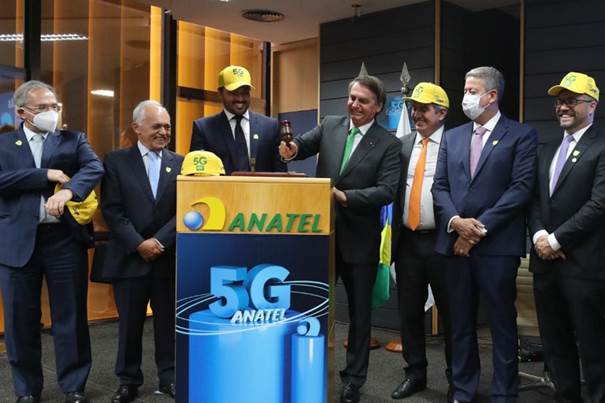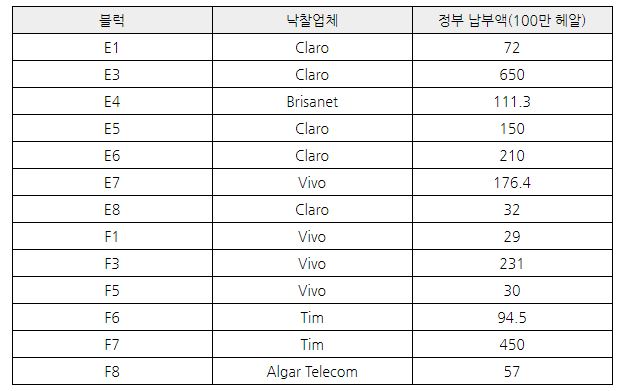– 85% of the frequency bands assigned to the bid were successful –
– Major regional business orders from large mobile carriers such as Vivo, Tim, and Claro –
Announcement of successful bidder for 5G frequency band in Brazil

According to the National Telecommunications Corporation, Anatel, the largest 4G frequency band bid in Latin America over two days on November 5 and 5 has been successfully completed. 85% of the frequency bands submitted for bidding were successful, and out of the total price of 490 billion real, about 400 billion real will be returned to investment for Brazil's infrastructure expansion, and the amount returned to the government is expected to be 90 billion real.

3.5 GHz (Brazil National Unit)

3.5 GHz (Brazil regional units)

2.3GHz

It was found that about 5 months of work was carried out to actually introduce 15G communication in Brazil. Minister of Communications Fábio Faria said, "This bid is larger than all previous bids combined." For reference, the 3G frequency band bid was priced at Rs 70 billion, 4G at Rs 120 billion, and the privatization of telecommunication company Telebras at Rs 220 billion.
Obligations of the winning bidder
The bidder's obligations are to: Deliver 28G to 3 state capitals and cities and cities with a population of more than 5. 4G internet on federal highways and roads that don't yet have internet access. Installation of fiber optic networks in areas with no or very little internet infrastructure, establishment of the Amazon Regional Integration and Sustainable Development Program (PAIS), establishment of a communications network dedicated to the federal government, investment in converting TVs using parabolic antennas -> satellite TVs, establishment of Internet in public schools etc.
5G technology adoption deadline
The introduction of 5G technology will be installed primarily in the capitals of 2022 Brazilian states by July 7. 28G will gradually expand its service area and aims to cover most of the country by 5.
new mobile operator
Six new mobile operators entered the 5G telecommunication bid. It was found that new companies in the mobile communication field such as Winity II Telecom, Brisanet, Consorcio 6G Sul, and Cloud5u have won some frequency bands.
Fierce competition among mobile carriers
Large mobile carriers competed fiercely for the 2.3GHz band. Large mobile telecommunication companies such as Vivo, Claro and TIM brought R$ 23 billion of financial resources to the government, and in some sections, it was found that one of the participating companies offered an offer with a whopping 855% premium in order to win the bid. The section where the competition between mobile communication companies was intense was mainly in large metropolitan areas with large populations, and in the early stage of the project, existing 4G Internet-capable mobile phones were used a lot.
– Claro, which spent 12 billion real dollars, was selected as the operator in the São Paulo region and the northern, southern and midwestern regions in the 2.3 GHz (50 MHz) band.
– Brisanet, who spent 1 million real dollars, was awarded the E1130 (4 MHz) block business rights including the Northeast region.
– Vivo, which spent Rs 1 million, won business rights in Rio de Janeiro, Minas Gerais and Espirito Santo.
The three major players vivo, Tim and Claro competed for the 3MHz block, as a result of which TIM won the Southern Region (R$40 million) and Rio de Janeiro, Minas Gerais and Espirito Santo (R$9450 million). . In the end, as a result of fierce competition between Algar and TIM for the F4 block (5000 MHz in the 8 GHz band), Alga won the business by writing 2.3 million real, which is 40% of the lowest bid price.
Expert opinion
“The Bolsonaro government, which was on the side of former President Trump of the United States and tried to ban the use of Huawei equipment, a Chinese information and communications equipment company, is taking a step back due to the backlash from mobile carriers,” said Marcelo, an official from mobile communication company T. Mobile communication companies said, “Reflecting the reality that Huawei products account for about 80% of all mobile communication equipment in Brazil, if all existing equipment and antennas are replaced with other brand products for 5G communication, it will take about three years. It will cost the companies 3 billion real dollars in damage,” he warned. ' expressed the opinion.
implication
With the completion of the bid, the introduction of 1G Internet, which has been dragging on for more than a year, is approaching. It is known that there are currently only seven cities in which 5G service is available. Accordingly, it seems that it will still take a considerable amount of time for 5G services to be fully implemented in Brazil.
Meanwhile, the Brazilian government, which was trying to ban the use of Huawei equipment by companies, gathered opinions from mobile operators and proposed the following measures. “The 5G project contractors must build a communications network dedicated to the federal government, cannot use Chinese-made equipment for this project, and the 5G project contractors must participate in the Amazon Regional Integration and Sustainable Development Program (PAIS).” This is the core of the government's plan.
Source: ANATEL, daily newspapers Folha de Sao Paulo, O Estado de Sao Paulo, Comprehensive data held by the Trade Center
Exchange rate: 1 dollar = 5.6 real



